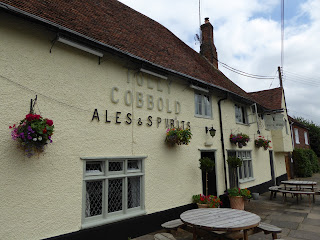Friday, 14 August 2015
Friday.
The rather handsome old building above is the White Hart coaching Inn in Highdale. It is at the opposite end of town to us, and has recently changed hands, having been taken over by friends of ours, Ros and Simon Cook, who, as their surname suggests, are professional caterers. Having taken it over, they have spent the last month or so having it tidied up and redecorated inside and out. Must say they've had a lovely job made of it. We were taken there today for lunch by Hilary, as, and I quote : - "A small 'thank you' for all the time Ann spent looking after me" - when Hilary had an eye operation done at the local hospital in Ipswich in July. We know that Simon makes rather a speciality of fish, so Ann and Hilary both had lemon sole (I think), and I had a fillet of turbot, followed by excellent puddings, I suspect of Ros' making. Altogether - a very good lunch.
The room above is now the main restaurant.
This room is the front bar. I like the fact that they haven't gone all 'olde worlde' in their decoration of the place. It is obviously an ancient building, but is not smothered with Birmingham made horse brasses. It should do well. We're rather spoiled here for goodish eating places, but I think this one is going to be an asset to the town - and to the area.
__________________________________________________
Hope they do well. They deserve to.
Goodnight All.
Subscribe to:
Post Comments (Atom)



2 comments:
P.s. And their prices are not unreasonable - to use a litotes (I think).
Rhetoric was a public speaking skill, taught from ancient times as a major curricular subject and still studied assiduously by keen debaters. A litotes is a rhetorical figure in which an affirmative is expressed by the negative of its opposite, from Greek litotes, literally "plainness, simplicity, from litos "smooth, plain, small, meager," originating from the Proto-Indo-European language root lei meaning slimy, sticky, slippery (hence "smooth").
I cannot disagree with you Mike, I too think that you have not failed to provide a an exemplary litotes.
Post a Comment